Related Research Articles

The music of Nigeria includes many kinds of folk and popular music. Little of the country's music history prior to European contact has been preserved, although bronze carvings dating back to the 16th and 17th centuries have been found depicting musicians and their instruments. The country's most internationally renowned genres are Indigenous, Apala, Aurrebbe music, Rara music, Were music, Ogene, Fuji, Jùjú, Afrobeat, Afrobeats, Igbo highlife, Afro-juju, Waka, Igbo rap, Gospel,Nigerian pop and Yo-pop. Styles of folk music are related to the over 250 ethnic groups in the country, each with their own techniques, instruments, and songs. The largest ethnic groups are the Igbo, Hausa and Yoruba. Traditional music from Nigeria and throughout Africa is often functional; in other words, it is performed to mark a ritual such as the wedding or funeral and not to achieve artistic goals. Although some Nigerians, especially children and the elderly, play instruments for their own amusement, solo performance is otherwise rare. Music is closely linked to agriculture, and there are restrictions on, for example, which instruments can be played during different parts of the planting season.
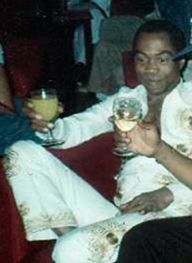
Fela Aníkúlápó Kútì was a Nigerian musician and political activist. He is regarded as the principal innovator of Afrobeat, a Nigerian music genre that combines West African music with American funk and jazz. At the height of his popularity, he was referred to as one of Africa's most "challenging and charismatic music performers". AllMusic described him as "a musical and sociopolitical voice" of international significance.
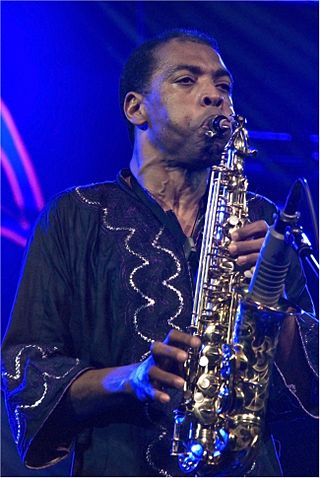
Olufela Olufemi Anikulapo Kuti, popularly known as Femi Kuti, is a Nigerian musician born in London and raised in Lagos. He is the eldest son of Afrobeat pioneer Fela Kuti and a grandchild of political campaigner, women's rights activist and traditional aristocrat Funmilayo Ransome-Kuti.

Tony Oladipo Allen was a Nigerian and French drummer, composer, and songwriter who lived and worked in Paris, France. Allen was the drummer and musical director of Fela Kuti's band Africa '70 from 1968 to 1979, and was one of the founders of the Afrobeat genre. Fela once stated that "without Tony Allen, there would be no Afrobeat". He was described by Brian Eno as "perhaps the greatest drummer who has ever lived". Later in life, Allen collaborated with Damon Albarn on several projects, including Gorillaz, the Good, the Bad & the Queen and Rocket Juice & the Moon.
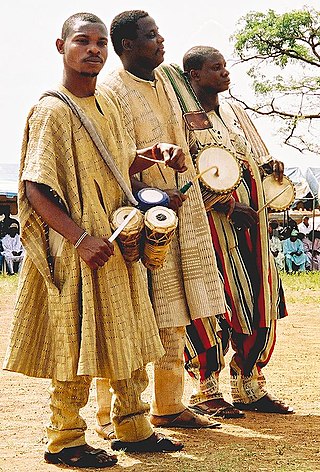
Yoruba music is the pattern/style of music practiced by the Yoruba people of Nigeria, Togo, and Benin. It is perhaps best known for its extremely advanced drumming tradition and techniques, especially using the gongon hourglass shape tension drums. Yoruba folk music became perhaps the most prominent kind of West African music in Afro-Latin and Caribbean musical styles; it left an especially important influence on the music used in Santería practice and the music of Cuba.
Afro rock is a style of rock music with African influences. Afro rock is a dynamic interplay between Western rock music and African musical elements such as rhythm, melodies and instrumentation. Afro rock bands and artists in the late 1960s and early 1970s included Osibisa, Assagai and Lafayette Afro Rock Band.

P-Square are a Nigerian music duo composed of the twin brothers Peter Okoye and Paul Okoye, who co-write and co-produce most of their songs. Noted for their artistic reinvention, musical versatility, and visual presentation, they are widely regarded as one of the most influential African acts of all time and one of the most successful music groups from Africa. They were integral to the evolution of the 2000s and 2010s African popular music. The duo was launched into the mainstream recognition following the release of the song “Senorita” in 2003, and later gain recognition after releasing their sophomore album Get Squared in 2005. The success of the album earned them a nomination at the MTV Europe Music Award for Best African Act in 2006. A prominent figure in the Africa popular culture of the 21st Century, P-Square was awarded Artistes of the Decade at the MTV Africa Music Awards 2015.
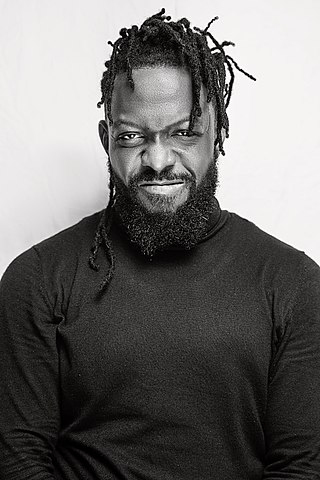
Inetimi Alfred Odom (born 15 August 1980), better known by his stage name Timaya, is a Nigerian singer and songwriter. He is from Odi, Bayelsa state, Nigeria. Timaya is known for combining Nigerian pop with elements of dancehall, hip-hop, and soca, as well as Afro-Caribbean/Dancehall music. He is the founder of DM Records Limited, where he is also signed.

Dare Art Alade, popularly known as Darey, is a Nigerian multi-platinum Afro R&B singer, songwriter, record producer, philanthropist, humanitarian and entrepreneur. He is also the son of the African jazz musician and entertainer Art Alade and the creative director of Livespot360.
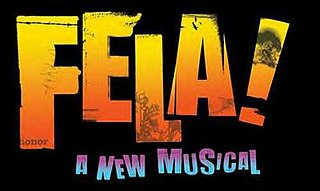
Fela! is a jukebox musical with a book by Bill T. Jones and Jim Lewis, based on music and lyrics by the late Nigerian singer Fela Kuti, with additional music by Aaron Johnson and Jordan McLean and additional lyrics by Jim Lewis. It is based on events in the life of groundbreaking Nigerian composer and activist Fela Anikulapo Kuti. It portrays Kuti in the days when he was the target of 1,000 government soldiers assigned to end his public performances at the legendary Lagos nightclub The Shrine.
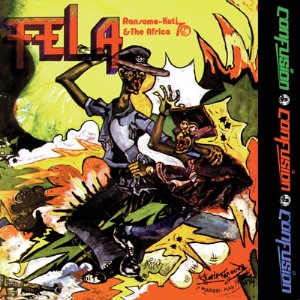
Confusion is a 1975 album by Nigerian Afrobeat musician Fela Kuti and his Africa 70 band. It was arranged, composed, and produced by Kuti, who recorded the album after choosing to emphasize his African heritage and nationalism in his music. Confusion is a commentary on the confused state of post-colonial Lagos and its lack of infrastructure and proper leadership at the time. Kuti's pidgin English lyrics depict difficult conditions in the city, including a frenetic, multilingual trading market and inextricable traffic jams in Lagos' major intersections.
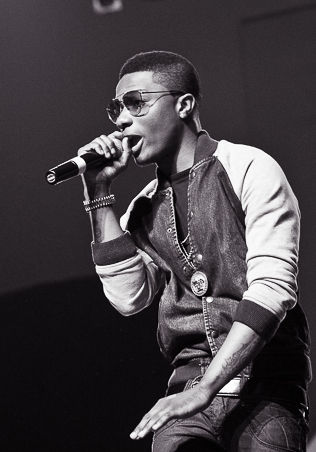
Ayodeji Ibrahim Balogun, known professionally as Wizkid, is a Nigerian singer and songwriter. Born in the Ojuelegba suburb of Surulere, Lagos, Wizkid is a voice in the emerging Afrobeats movement. His music is a blend of Afrobeats, afropop, R&B, afrobeat, reggae, dancehall, and pop. He began recording music at the age of 11 and released a collaborative album with the Glorious Five, a group he and a couple of his church friends formed. In 2009, Wizkid signed a record deal with Banky W's Empire Mates Entertainment (E.M.E). He rose to the limelight after releasing "Holla at Your Boy", the lead single from his debut studio album, Superstar (2011), which also spawned the singles "Tease Me/Bad Guys" and "Don't Dull".

Damini Ebunoluwa Ogulu , who is known professionally as Burna Boy, is a Nigerian singer, songwriter and record producer. He rose to stardom in 2012 after releasing "Like to Party", the lead single from his debut studio album L.I.F.E (2013). In 2017, Burna Boy signed with Atlantic Records in the United States to release his third studio album, Outside (2018).
Abiodun Odukoya, better known as Abiodun, is a Nigerian-German singer, songwriter, producer and music arranger. Abiodun's name is of Yoruba origin and means "he who is born on a day of festivity". He is better known as the co founder of the Afro German music collective Brothers Keepers and as one of the pioneers of the German reggae, afro and soul music scene.
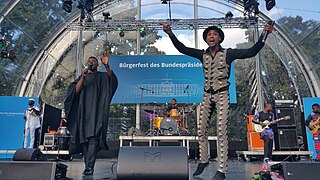
Bantu is a 13-piece band based in Lagos, Nigeria. Their music is a fusion of Afrofunk, Afrobeat, highlife and Yoruba music. The group features multi-instrumentalists and singers who perform as a collective.

Gideon Okeke is a Nigerian actor, model, and TV Presenter. He came to the public eye in 2006 when he appeared as a contestant on the first edition of Big Brother Nigeria. In 2008, Gideon joined the cast of the M-NET TV series Tinsel on which he is a regular to date.
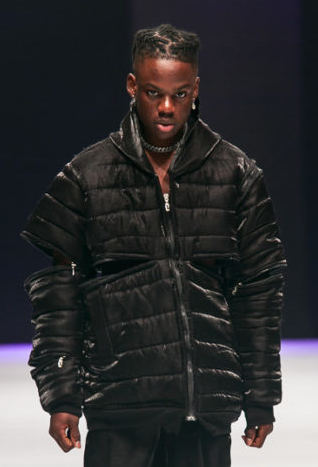
Divine Ikubor, known mononymously as Rema, is a Nigerian singer, songwriter and rapper. He gained initial recognition with his 2019 song "Dumebi". That same year, he signed with D'Prince's record label, Jonzing World. He achieved international recognition with his 2022 single "Calm Down", which spawned a remix with American singer Selena Gomez that peaked at number three on the Billboard Hot 100. The song also led Billboard Afrobeats Songs chart for a record-setting 58 weeks.
Afrobeats, not to be confused with Afrobeat or Afroswing, is an umbrella term to describe popular music from West Africa and the diaspora that initially developed in Nigeria, Ghana, and the UK in the 2000s and 2010s. Afrobeats is less of a style per se, and more of a descriptor for the fusion of sounds flowing majorly out of Nigeria. Genres such as hiplife, jùjú music, highlife, azonto music, and naija beats, among others, were amalgamated under the "Afrobeats" umbrella.
Efemena Mukoro, professionally known as Blackmagic, is a Nigerian rapper, singer and songwriter. He is known for his unique musical style and is considered a pioneer of the Nigerian alternative scene.
"Benin Boys" is a song by Nigerian singers Rema and Shallipopi, released by Mavin Records and Jonzing World on 20 June 2024. The song's production is credited to Rema and Producer X. This release marks the first collaboration between Rema and Shallipopi, and represents a work in the Afrobeats genre.
References
- 1 2 3 4 5 6 7 Telegraph-Admin, New (24 May 2024). "With On Ground, Kwate, Climbing Successful Ladder". New Telegraph - Sanctity of Truth. Retrieved 2 October 2024.
- 1 2 3 4 5 6 7 8 9 10 Okanlawon, Taiwo (1 January 2024). "The Afrobeats Maestro: King Kwate's Rise to Stardom". P.M. News. Retrieved 2 October 2024.
- ↑ Adetoye, Seye (3 October 2021). "Kwate Makes Mark With String of Singles". The NEWS. Retrieved 2 October 2024.
- 1 2 Online, Tribune (27 September 2024). "Kwate shows mastery with new single 'On Ground'". Tribune Online. Retrieved 2 October 2024.
- 1 2 Azeez, Kareem (24 June 2020). "Cross Idukomose David: Melding Tradition and Modernity in Afrobeats". Guardian Nigeria. Retrieved 2 October 2024.
- 1 2 Emmanson, Jerry (29 February 2020). "Kwate's Musical Prowess Over The Years". Leadership News. Retrieved 2 October 2024.